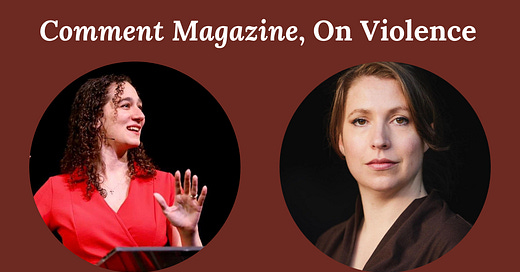This afternoon (May 15), I’m part of an Author’s Conversation for Comment magazine, for their latest issue, “On Violence.” You can register to join us on zoom here.
I’m very pleased to join April Lawson, who I worked with on debates both in college and professionally, for today’s Author Conversation hosted by Comment magazine.
We both drew on our debate experience to talk a little about how to navigate conflict where violence could break out, and maybe people want it to. And our pieces were both written well before the campus encampments for Gaza, but I’m sure we’ll be discussing those clashes.
From April’s “Why We Cancel”:
Is it so strange, then, that the expression of beliefs that are highly correlated with dangerous action—especially when affirmed by the larger community—can cause one’s body to perceive danger? When people say, “That statement makes me feel unsafe,” they are making a claim to certain rights, but they’re also offering an accurate description of the unconscious effect certain words can produce. Bodies feel unsafe when they encounter stimuli they associate with danger. Is it such a stretch to say that loudly asserting acceptance of physical violence—say, by calling for the cleansing of a group or, more subtly, declaring that boys will be boys and therefore there’s nothing we can do about their sexual proclivities—is on the spectrum of violence too?
My argument is emphatically not that physical violence and dangerous words are the same. There is a difference between a threat and a bullet. But a deeper understanding places them at different points along the same spectrum rather than as things completely different in kind.
From my “Mutual Endangerment Society”:
There’s something thrilling about the possibility of a state of exception, where it becomes obvious to everyone in an instant that the normal rules don’t apply. I can fantasize that, with all limits removed, some extraordinary mettle that my ordinary life doesn’t require of me will be revealed at last. It’s what OkCupid was getting at when it asked, as part of its matching algorithm, “In a certain light, wouldn’t nuclear war be exciting?” I made sure to answer no, even though part of me thought yes, because I didn’t want to match with the people who said yes without guilt.
But there are plenty of other places to match with the people who say yes, and hearing that yes—that quiet hope that a crisis is coming and everything will be different after—makes the yes get a little louder and a little less guilty. The particular yes gaining ground is the idea that soon, we might reach a point where violence is allowed, where the rules have all changed, and the principle of self-defence holds sway. Look closely at your opponent, assess every possible sign of strength, every weapon they might bring to bear against you . . . every day we get closer to the magic threshold where you become a hero for punching back, whether or not they’ve actually punched first.
And Nellie Bowles, author of the newly released Morning After the Revolution, won’t be part of today’s event, but I appreciated the recent excerpt from her book I read about her own experience participating in a pile-on:
I was proud. People said I’d done the right thing. To do a cancellation is a very warm, social thing. It has the energy of a potluck. Everyone brings what they can, and everyone is impressed by the creativity of their friends. It’s a positive thing, what you’re doing, and it doesn’t feel like battle, but like tending the warm fire of community. You have real power when you’re doing it, and with enough people, you can oust someone very powerful.
It’s a topic she’s been wrestling with for years, and I remember reading this on her
substack (chronicling her conversion to Judaism).The people who believe a single social error — dumb tweets sent as a teenager, let’s say — should destroy a life and make a woman unemployable, socially ostracized and ideally unbanked . . . those people may seem like jerks. But look at it through this lens, and perhaps their impulse comes from an idyllic view of human nature. If you are willing to ruin a person over a mistake, you must think that mistakes are wild aberrations.
I’m looking forward to a good conversation today on where we draw the line and what means we use to beat the bounds of our community.
And speaking of community, I’ve had the pleasure of running into more Other Feminisms readers in person of late, so please always do introduce yourself if we’re at the same event, in person or on zoom.




